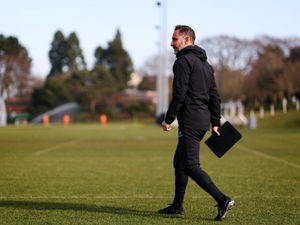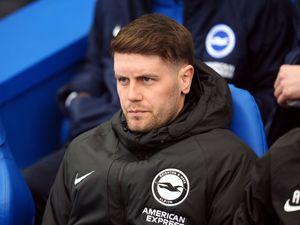Paul Gladon on his short Wolves stay and 'no regrets' over Molineux switch
It’s that time again. The transfer window is open, prompting immeasurable column inches and reams of digital airspace of speculation, of who’s leaving who, who wants to go where, and who is being pushed out of the door.

Sky Sports' yellow ticker will be cranking into overload, the word ‘announce’ will be hurled relentlessly at club social media accounts, and ever new and creative ways of heralding new arrivals will be concocted by skilled press departments.
Fans wouldn’t have it any other way.
And, when the dust has settled, and the squad numbers have been announced, some of the signings will go on to become roaring successes. Some just won’t work, and some will just be a bit ‘meh’.
That will be the same at every club and Wolves, like all, have had good windows, bad windows and indifferent windows.
However, there have been few like that which unfolded – in a few short weeks - in the summer of 2016.
With Fosun having completed their takeover of the club a week before the end of July, and then seen intended new manager Julen Lopetegui – wonder whatever became of him? – take the opportunity of becoming coach of Spain rather than Wolves, boss Walter Zenga arrived on the day of the final pre-season friendly against Swansea, with only a month remaining of the window.
Over those few weeks, having already bought in goalkeeper Andy Lonergan, Wolves collected a further 12 new faces. A new recruitment dynamic was added to the mix with the existing Molineux hierarchy having to quickly adapt and not necessarily follow the procedures and methodology they had become accustomed to. It was like a footballing version of Supermarket Sweep, a mad dash to assemble and revamp a Wolves squad which was to prove as cosmopolitan as it was difficult to produce any sort of rhythm and consistency.
And yes, some worked well, others didn’t, and some were a bit ‘meh’.

It was into that slightly chaotic environment that amiable Dutch striker Paul Gladon checked in.
Then 24, the 6ft 6in frontman had made an impressive start to the season with Heracles Almelo in the Eredivisie – the top division in the Netherlands – having just stepped up to be the main man up front following the departure of Wout Weghorst to AZ Alkmaar.
“I had made a really good start to that season, scoring a couple of goals in three league games, and, when Wolves came in, I wasn’t sure what to do,” Gladon recalls.
“I remember speaking with the owners and Kevin Thelwell (then Head of Development & Recruitment), and in the beginning I said no, I thought it might be too soon.
“They asked me to come over, and just have a look at the stadium and the training ground, so I visited Molineux and Compton Park.
“That was what made it different for me, I fell a little bit in love with Wolves when I saw all of that.
“I spoke with my father and brother and they said I had to do it, to take the chance and see how it goes.
“I spoke with the manager Walter Zenga as well, and he said he wanted me, so it all gave me a good feeling and I decided to say yes.”
Gladon made the move for around £1million and put pen to paper on a three-year contract.
And while, as he will explain, the move didn’t quite go entirely to plan, and he might be remembered more by Wolves fans for social media pictures of him in local restaurants, in essence, it could so easily have played out as Gladon’s next step on the career ladder.
The chance to ply his trade with a big club aiming to be upwardly mobile from the Championship would have been seen as progress from a career which had been equally progressive since joining his first professional club – later than most in the Netherlands – with Sparta Rotterdam at the age of 17.
Growing up playing at his local club SV Hoofddorp, at one point in junior football he scored 102 goals in a season, including 14 in one match.
Having been signed by Sparta, Gladon excelled at Under-19 level up against contemporaries such as Memphis Depay and Jurgen Locadia, but, after notching 14 goals in the first half of the season, was promoted to the first team set-up.
That was to prove something of a bitter-sweet development as, with Sparta pushing for promotion, opportunities for younger players were limited and Gladon was not given a sustained chance to build on the prolific form displayed at youth level.
“If I had been able to wait and carry on scoring goals for the Under 19s it might have been better but when a chance comes up for first team football you have to try and take it,” he recalls.
Things were moving quickly, and, as he continued to adapt to senior football, part of that process saw him spend the 2013/14 season on loan with Dordrecht, a smaller club than Sparta, but also occupying the Dutch second division.





